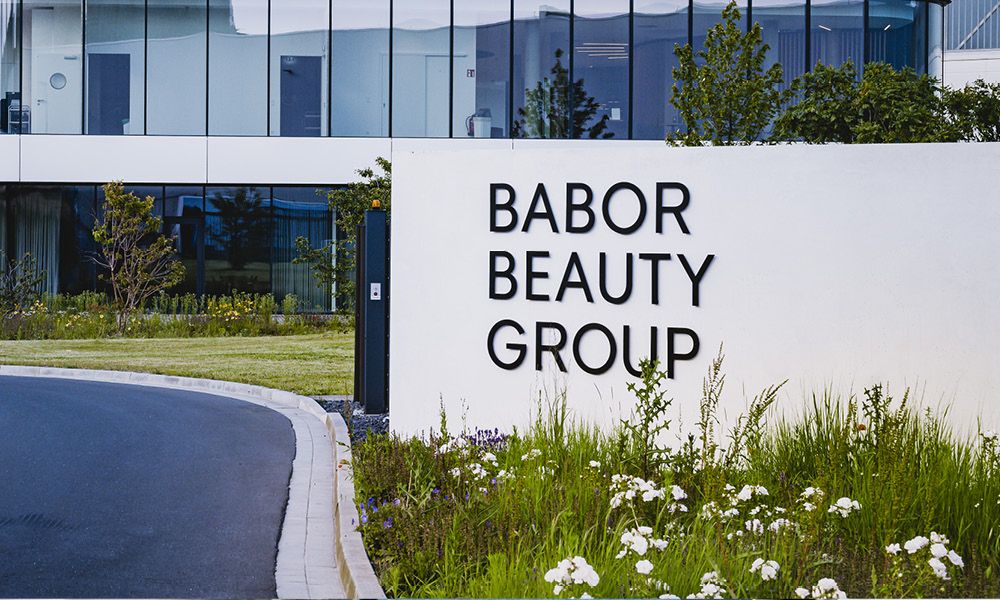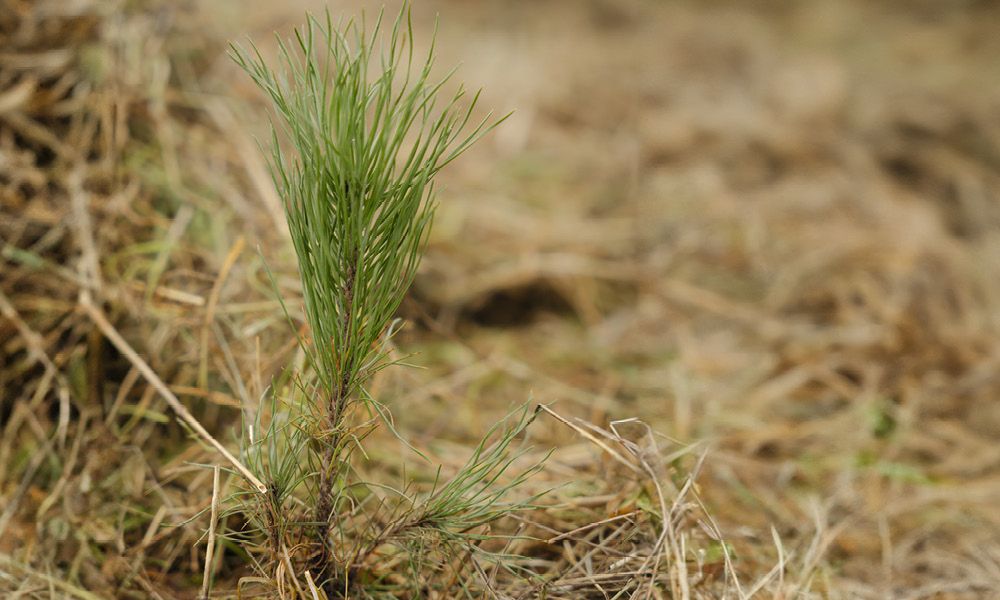BECAUSE PIONEERING IS IN OUR
BECAUSE PIONEERING IS IN OUR
BECAUSE PIONEERING IS IN OUR
The BABOR BEAUTY GROUP’s declared goal and understanding of decarbonization is that the reduction of carbon emissions always takes priority over offsetting. Emissions that cannot currently be avoided are offset through a partnership with Klim. The goal of reducing the corporate carbon footprint (CCF) to a maximum of 50% of the 2019 value by 2025 was already achieved with the 2024 balance sheet. As the core driver of the CCF lies in the mobility of employees and their daily journeys as well as in the vehicle fleet and business travel, the company has developed a sophisticated mobility concept. The company is rolling out a 100% e-car policy, with e-cars currently making up 60% of the vehicle fleet. To determine and reduce product emissions, a balance sheet is carried out annually and opportunities to reduce emissions are sought for every new product development. This applies to the selection of suppliers as well as to ingredients and packaging materials.
BEYOND CARBON
FIRST CLASS EVEN IN ITS SECOND LIFE
In 2024, 80% of all BABOR brand packaging materials were already recyclable. The entire company aims to achieve a rate of 95% by 2030 at the latest. In addition, 100% of the materials used in BABOR products should then be traceable. This will ensure that all components come from sustainably managed suppliers.
The use of recycled materials is often a compromise in terms of quality. It is therefore a challenge for BABOR product development to design sustainable materials that are compatible with our quality standards. BABOR is therefore increasingly focusing on highly recyclable packaging and recyclable shipping materials. Since 2020, all BABOR packaging has been made exclusively from FSC-certified paper. In addition, the products are not cellophane-wrapped and the use of packaging materials that can be detected during recycling is being promoted.
The product leaflets have been removed from BABOR packaging boxes and replaced by QR codes. This measure alone leads to a material reduction of almost four tons of paper per year. The BABOR BEAUTY GROUP is pursuing the goal of waste-free operations: recyclable materials that are no longer usable for operational reasons (paper, cardboard, plastics, metal) will be fully recycled from 2030 onwards, without exception, and the waste produced will be recycled by a certified waste disposal company in order to minimize the amount of waste.
FORMULATION STANDARD FOR THE BABOR BRAND
The BABOR brand aims to produce all skincare products according to an ambitious formulation standard – without compromising on effectiveness and pleasant textures. For this reason, the BABOR brand’s product philosophy allows the use of synthetic ingredients in very small quantities and only when necessary. The field is complex: Synthetic ingredients may also be sustainable and while natural ingredients can be harmful to the environment. BABOR is committed to using only ingredients that promote healthy skin conditions and support the efficacy of formulations. BABOR’s formulation Standard states that products must be made without microplastics – not just microplastic particles, but also synthetic polymers. They should also be made without silicones, parabens, PEGs, mineral oils, sulphates (SLS and SLES), non-certified palm oil and synthetic colorants. The company has been RSPO-certified since 2019 and has been sourcing RSPO-certified palm (kernel) oil derivatives ever since.
Would you like to know more about our sustainability initiatives? Click here for our sustainability report:
The BABOR BEAUTY GROUP’s declared goal and understanding of decarbonization is that the reduction of carbon emissions always takes priority over offsetting. Emissions that cannot currently be avoided are offset through a partnership with Klim. The goal of reducing the corporate carbon footprint (CCF) to a maximum of 50% of the 2019 value by 2025 was already achieved with the 2024 balance sheet. As the core driver of the CCF lies in the mobility of employees and their daily journeys as well as in the vehicle fleet and business travel, the company has developed a sophisticated mobility concept. The company is rolling out a 100% e-car policy, with e-cars currently making up 60% of the vehicle fleet. To determine and reduce product emissions, a balance sheet is carried out annually and opportunities to reduce emissions are sought for every new product development. This applies to the selection of suppliers as well as to ingredients and packaging materials.
BEYOND CARBON
FIRST CLASS EVEN IN ITS SECOND LIFE
In 2024, 80% of all BABOR brand packaging materials were already recyclable. The entire company aims to achieve a rate of 95% by 2030 at the latest. In addition, 100% of the materials used in BABOR products should then be traceable. This will ensure that all components come from sustainably managed suppliers.
The use of recycled materials is often a compromise in terms of quality. It is therefore a challenge for BABOR product development to design sustainable materials that are compatible with our quality standards. BABOR is therefore increasingly focusing on highly recyclable packaging and recyclable shipping materials. Since 2020, all BABOR packaging has been made exclusively from FSC-certified paper. In addition, the products are not cellophane-wrapped and the use of packaging materials that can be detected during recycling is being promoted.
The product leaflets have been removed from BABOR packaging boxes and replaced by QR codes. This measure alone leads to a material reduction of almost four tons of paper per year. The BABOR BEAUTY GROUP is pursuing the goal of waste-free operations: recyclable materials that are no longer usable for operational reasons (paper, cardboard, plastics, metal) will be fully recycled from 2030 onwards, without exception, and the waste produced will be recycled by a certified waste disposal company in order to minimize the amount of waste.
FORMULATION STANDARD FOR THE BABOR BRAND
The BABOR brand aims to produce all skincare products according to an ambitious formulation standard – without compromising on effectiveness and pleasant textures. For this reason, the BABOR brand’s product philosophy allows the use of synthetic ingredients in very small quantities and only when necessary. The field is complex: Synthetic ingredients may also be sustainable and while natural ingredients can be harmful to the environment. BABOR is committed to using only ingredients that promote healthy skin conditions and support the efficacy of formulations. BABOR’s formulation Standard states that products must be made without microplastics – not just microplastic particles, but also synthetic polymers. They should also be made without silicones, parabens, PEGs, mineral oils, sulphates (SLS and SLES), non-certified palm oil and synthetic colorants. The company has been RSPO-certified since 2019 and has been sourcing RSPO-certified palm (kernel) oil derivatives ever since.
Would you like to know more about our sustainability initiatives? Click here for our sustainability report:
The BABOR BEAUTY GROUP’s declared goal and understanding of decarbonization is that the reduction of carbon emissions always takes priority over offsetting. Emissions that cannot currently be avoided are offset through a partnership with Klim. The goal of reducing the corporate carbon footprint (CCF) to a maximum of 50% of the 2019 value by 2025 was already achieved with the 2024 balance sheet. As the core driver of the CCF lies in the mobility of employees and their daily journeys as well as in the vehicle fleet and business travel, the company has developed a sophisticated mobility concept. The company is rolling out a 100% e-car policy, with e-cars currently making up 60% of the vehicle fleet. To determine and reduce product emissions, a balance sheet is carried out annually and opportunities to reduce emissions are sought for every new product development. This applies to the selection of suppliers as well as to ingredients and packaging materials.
BEYOND CARBON
FIRST CLASS EVEN IN ITS SECOND LIFE
In 2024, 80% of all BABOR brand packaging materials were already recyclable. The entire company aims to achieve a rate of 95% by 2030 at the latest. In addition, 100% of the materials used in BABOR products should then be traceable. This will ensure that all components come from sustainably managed suppliers.
The use of recycled materials is often a compromise in terms of quality. It is therefore a challenge for BABOR product development to design sustainable materials that are compatible with our quality standards. BABOR is therefore increasingly focusing on highly recyclable packaging and recyclable shipping materials. Since 2020, all BABOR packaging has been made exclusively from FSC-certified paper. In addition, the products are not cellophane-wrapped and the use of packaging materials that can be detected during recycling is being promoted.
The product leaflets have been removed from BABOR packaging boxes and replaced by QR codes. This measure alone leads to a material reduction of almost four tons of paper per year. The BABOR BEAUTY GROUP is pursuing the goal of waste-free operations: recyclable materials that are no longer usable for operational reasons (paper, cardboard, plastics, metal) will be fully recycled from 2030 onwards, without exception, and the waste produced will be recycled by a certified waste disposal company in order to minimize the amount of waste.
FORMULATION STANDARD FOR THE BABOR BRAND
The BABOR brand aims to produce all skincare products according to an ambitious formulation standard – without compromising on effectiveness and pleasant textures. For this reason, the BABOR brand’s product philosophy allows the use of synthetic ingredients in very small quantities and only when necessary. The field is complex: Synthetic ingredients may also be sustainable and while natural ingredients can be harmful to the environment. BABOR is committed to using only ingredients that promote healthy skin conditions and support the efficacy of formulations. BABOR’s formulation Standard states that products must be made without microplastics – not just microplastic particles, but also synthetic polymers. They should also be made without silicones, parabens, PEGs, mineral oils, sulphates (SLS and SLES), non-certified palm oil and synthetic colorants. The company has been RSPO-certified since 2019 and has been sourcing RSPO-certified palm (kernel) oil derivatives ever since.
Would you like to know more about our sustainability initiatives? Click here for our sustainability report:



